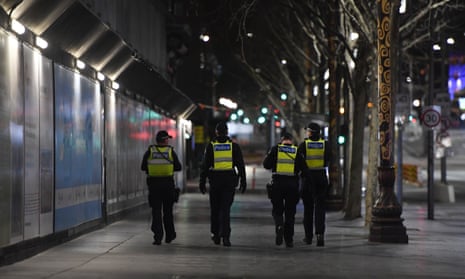The lockdown might be draconian, but Victorians overwhelmingly support the public health restrictions imposed to curb the second wave of coronavirus infections, with support for the measures highest among voters aged over 55, according to a Guardian Essential poll.
New research shows 72% of the sample backs the decision of the Andrews government to impose a curfew between 8pm and 5am, 71% supports curbs on leaving the house, while 70% endorse restrictions on business and the requirement that people travel no further than 5km from their house. Voters aged over 34 are more likely to support the current lockdown measures than younger people.
A strong majority, 79%, report having a good understanding of what they are permitted to do and not do under the restrictions. Majorities in the sample of 500 Victorian voters think the lockdown is appropriate (67%) and will be effective in flattening the curve of new infections (60%) – although 41% of respondents who remain in paid work worry the restrictions will have a negative impact on their employment.
Voters are more on the fence about whether state and federal governments are doing enough to help people and businesses that are negatively affected by the restrictions, with 55% saying enough is being done.
Victorian respondents to the survey are also divided about who is responsible for the failures in the enforcement of hotel quarantine that sparked the second wave of infections.
More than half of voters in the sample say they think the breaches in quarantine are mostly about individuals being irresponsible (56%) rather than failures in the system (44%). Women and younger voters are significantly more likely than men and older voters to think the breaches are an issue of individual responsibility rather than systemic failure.
Back in June, Daniel Andrews enjoyed an approval rating of 75% for his response to the Covid-19 outbreak. The premier’s approval rating is now down to 49%. But that result has been constant for a month despite significant numbers of new infections, and deaths, mainly in aged care facilities, during the outbreak.
Just under half the sample (44%) reports gaining a more favourable impression of the premier during the Covid crisis, while 29% of the sample says their view has become more negative.
While the majority of the attitudinal shift for Andrews is positive, despite the setbacks and the persistent questions about the government’s management of the crisis, the premier has enjoyed less of a bounce in the state than the prime minister, Scott Morrison.
While Victoria is Australia’s most progressive state, 58% of Victorians in the sample say they now have a more favourable opinion of Morrison because of his handling of the Covid-19 outbreak.
Older voters and voters in Melbourne are more likely to report a favourable shift in their perceptions about Morrison than younger voters and Victorians in the regions. Older voters are more represented in the negative shift in attitudes against Andrews than young people.
The survey data suggests perceptions of Andrews are tied heavily to the premier’s Covid-19 response. Voters who characterise the state government’s response as poor are more likely to say their opinion of Andrews is now less favourable, and vice versa.
The snapshot of Victorian sentiment comes as the data on new coronavirus infections suggest the outbreak in the state is now past its peak – although there are concerns about the rate of new infections in New South Wales.
The regular fortnightly Guardian Essential survey, published Tuesday, shows Australians are increasingly nervous about the second wave, and respondents rank stopping community transmission of Covid-19 higher on their list of priorities than restarting the economy and putting it on the road to recovery.
In this fortnight’s national poll, the New South Wales government’s approach to managing the pandemic is supported by 61% (compared with 70% at the peak). In Queensland – a state that has not yet battled a second outbreak – approval for the government is a bit more consistent, with 68% this week compared with 74% in May.
The prime minister’s approval rating is 66% this fortnight, compared with 63% in July, and his disapproval stands at 23%, compared with 27% last month, while 11% of the sample are undecided.
Morrison’s approval at the moment spans the political spectrum. It stands at 91% with Coalition voters, 56% among Labor voters and 40% of Greens voters – and 61% of people who say they intend to vote for an independent or micro party give him the thumbs up. The federal Labor leader Anthony Albanese has the approval of 69% of Labor voters, 37% of Coalition voters, 54% of Greens voters and 17% of people intending to vote for a non-major party.
